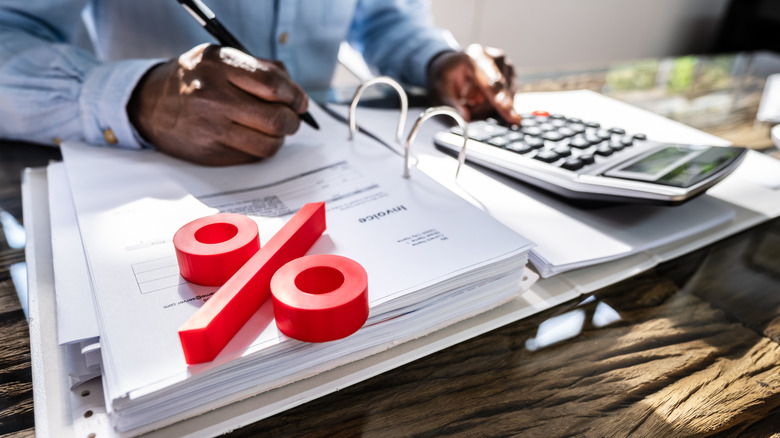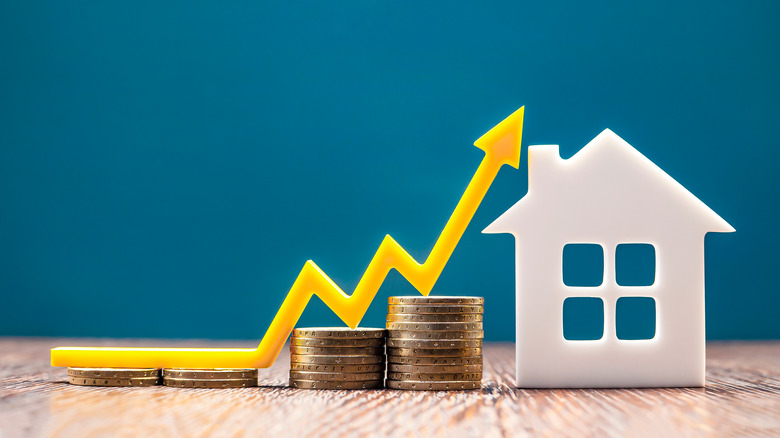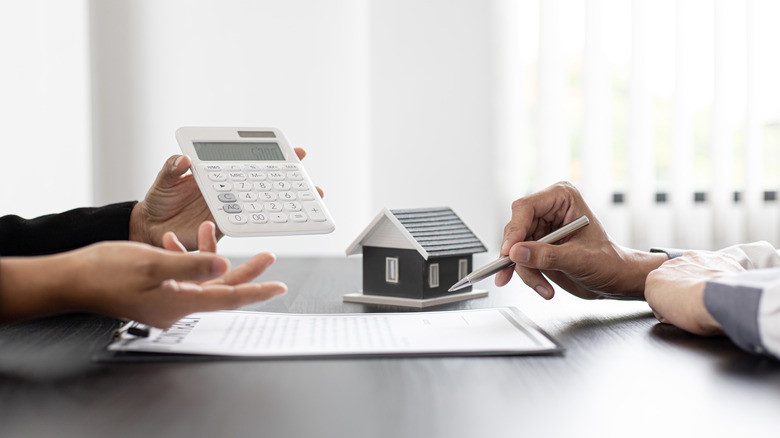Interest Rates Vs. House Cost: Which Is More Important When Buying A Home?
With all the conversation around rising interest rates, you may be wondering how much of an impact a higher interest rate may have on the process of buying a home. Whether you are a first-time homebuyer or are looking to upgrade your current place, it is well worth understanding the relationship between interest rates and the cost of your prospective new property and whether one is more important than the other when considering a house purchase.
As Rocket Mortgage explains, the cost of a residence is the sticker price you pay when you buy one, and the interest rate is the rate you are charged when taking out a home loan from a mortgage lender. No one will lend you money for free, unfortunately, and mortgage lenders ensure it is worth their while to float you some cash by charging you interest on paying that money back, meaning the lender will ultimately come out ahead. The rate of that interest charge can have just as consequential of an impact on your finances as the overall cost of the house you are hoping to buy, depending on your specific situation.
How interest rates impact home prices and vice versa
One crucial concept to understand when analyzing the relative importance of interest rates and home prices is that the two are both significant on their own, but they each also impact the other. Rocket Mortgage has a good breakdown of how this situation works in practice.
When interest rates are higher, it becomes more expensive for most people to borrow money since they will have to pay more in interest costs over the years. A higher cost associated with borrowing money leads to prospective homebuyers taking out smaller loans, meaning they will ultimately have less money to submit as a home offer. When more people make lower offers, home prices tend to decrease.
However, it is also important to note that while higher interest rates may be a factor in contributing to lower home prices, there are many other factors also at play in the housing market. For example, suppose the supply of available houses for purchase continues to be low. In that case, as it happens in much of the United States, according to NPR, demand for properties will remain high, and more competition means home prices may not drop, regardless of raised interest rates.
How interest rates and home prices impact down payments
Home prices and interest rates do not just affect each other; they also impact other components of home buying, including the down payment. A down payment, as explained by NerdWallet, is the cash you pay upfront for a house purchase, with the mortgage loan dictating future payments you will make to make for the rest of the purchase price. Most mortgages require a down payment, with some needing a certain percentage of the home's purchase price. As a result, down payments are usually described in terms of their percentage of the cost of the house as opposed to a cash value, i.e., a 15% down payment as opposed to a down payment of $60,000.
Because down payments are so closely related to the value of the cost of the home, the price has a significant and direct impact on how much you may end up paying upfront. But don't think interest rates aren't also crucial in this scenario. The lower the percentage of your down payment, the higher the lender will likely charge you for interest. So less money up front equals more money later.
How interest rates and home prices impact monthly payments
Once you have submitted your down payment, signed your mortgage paperwork, moved in, and are preparing to make your first mortgage payment, you are still affected by your home's price and interest rate. The cost of your property and the rate your lender charges you on your mortgage will determine the monthly payment amount (along with some other factors, such as the length of your mortgage loan's term). As Investopedia explains, monthly mortgage payments are broken down into several components, with the two largest typically being principal and interest.
Principal refers to the amount of your monthly payment that contributes to paying off the amount of money you originally borrowed from your mortgage lender. For example, let's say you purchased a $400,000 home with a $30,000 down payment, borrowing $370,000 from your mortgage lender to cover the difference. That $370,000 is your loan's principal. Therefore, the more you pay for a house, the higher your loan principal will be.
Interest refers, of course, to the rate of interest your mortgage lender charges you for borrowing their money. Therefore, a higher interest rate will also naturally lead to a higher monthly payment.
The effect of amortization on interest rates
When navigating the home buying process, you may hear about amortization. Amortization helps to further explain the relationship between the house price and interest rates and how both contribute to your monthly payments.
The Consumer Financial Protection Bureau explains the amortization process. At the beginning of your loan term, your loan's principal is quite large since you haven't made many payments. As a result, the interest charged on your loan is also quite large. Since your interest is so expensive at the beginning of your loan, the bulk of your monthly payment for the first few years you have your mortgage will go towards the interest, not the principal. The longer you own your home, the smaller the principal becomes, so the interest rate decreases and more of your monthly payment goes towards building equity in your home instead of paying off your loan's costs.
A higher home price (higher loan principal) and a higher interest rate can contribute to a slower amortization process. Therefore, if you plan on selling your home fairly quickly, you may want to consider how the interest rate, in particular, will impact how quickly you can build equity in your home.
Interest rates, home prices, and buyer goals
The relative importance of an interest rate or a home price when buying a property can vary depending on your personal goals as a homebuyer. If you want a larger house, possibly because you are planning on growing your family, you will likely have to contend with a higher price. Higher interest rates could affect your overall budget and limit access to the home types you seek. In this instance, it may be advisable for you to wait out a period of higher interest rates and delay purchasing your place until interest rates go down or until you can improve your credit and secure a lower rate that way.
It can be fairly straightforward for buyers to be selective about their home price by setting a budget for how much they are willing to pay. Unfortunately, interest rates are less under a buyer's control — and remember, they directly affect home prices and vice versa. A higher house price means your down payment will likely be a lower percentage of the home's overall value, which will also drive up your loan's interest rate.
Ultimate takeaway on interest and home price
There is no simple answer to the question of whether interest rates or home prices are more important when it comes to buying a home. Each prospective homebuyer's situation is a little bit different, depending on their credit score, how much they are able to spend on a down payment, their budget for their future house, and a number of other factors, including those that are outside of a buyer's control, like the interest rate baselines that are set at the federal level.
The wisest course of action for any future homeowner is to sit down and calculate how much they can actually afford to pay on a monthly mortgage and play around with house costs and interest rates until they land on a healthy budget for their home buying journey.






